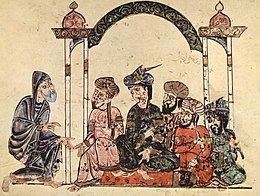| Part of a series on |
| Arabic culture |
|---|
 |
Pre-Islamic Arabic poetry (or simply pre-Islamic poetry) refers to the corpus of Arabic poetry composed in pre-Islamic Arabia roughly between 540 and 620 AD.
One of the first major poets in the pre-Islamic era is Imru' al-Qais, the last king of the kingdom of Kinda. Although most of the poetry of that era was not preserved, what remains is well regarded as among the finest Arabic poetry to date. In addition to the eloquence and artistic value, pre-Islamic poetry constitutes a major source for classical Arabic language both in grammar and vocabulary, and as a reliable historical record of the political and cultural life of the time.[1]
Poetry held an important position in pre-Islamic society with the poet or sha'ir filling the role of historian, soothsayer and propagandist. Words in praise of the tribe (qit'ah) and lampoons denigrating other tribes (hija') seem to have been some of the most popular forms of early poetry. The sha'ir represented an individual tribe's prestige and importance in the Arabian peninsula, and mock battles in poetry or zajal would stand in lieu of real wars. 'Ukaz, a market town not far from Mecca, would play host to a regular poetry festival where the craft of the sha'irs would be exhibited.[1]
Alongside the sha'ir, and often as his poetic apprentice, was the rawi or reciter.[2] The job of the rawi was to learn the poems by heart and to recite them with explanations and probably often with embellishments. This tradition allowed the transmission of these poetic works and the practice was later adopted by the huffaz for their memorisation of the Qur'an. At some periods there have been unbroken chains of illustrious poets, each one training a rawi as a bard to promote his verse, and then to take over from them and continue the poetic tradition. For example, Tufayl trained 'Awas ibn Hajar, 'Awas trained Zuhayr, Zuhayr trained his son Ka`b, Ka`b trained al-Hutay'ah, al-Hutay'ah trained Jamil Buthaynah and Jamil trained Kuthayyir `Azza.
- ^ a b Stetkevych 1993.
- ^ Allen 2005, p. 114.
© MMXXIII Rich X Search. We shall prevail. All rights reserved. Rich X Search
